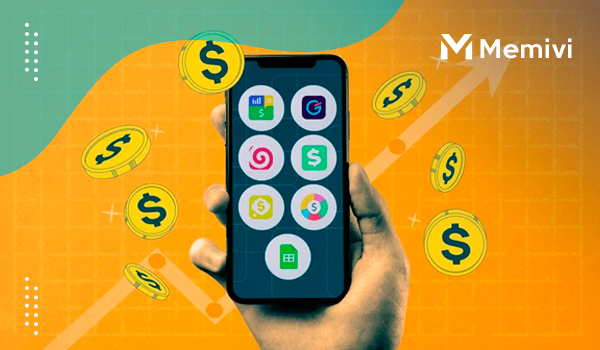Managing your finances can be a daunting task, but with ‘The 7 best financial control apps’, it’s easier than ever.

These apps offer various features designed to simplify budgeting, track expenses, and even save money. Whether you’re looking for comprehensive tools or specific functionalities, there’s an app on this list for you.
Top Features of Financial Control Apps
For those looking to manage their finances effectively, understanding the top features of financial control apps is crucial. Budget Tracking is an essential component, allowing users to see where their money goes. Most apps offer an intuitive interface where you can categorize expenses and track spending patterns.
- Expense Categorization helps in organizing expenses into different categories such as food, bills, or entertainment. This way, users can quickly identify areas where they might need to cut back.
- Syncing with Bank Accounts ensures that all transactions are automatically recorded, saving time and effort. This feature keeps the financial data accurate and up-to-date.
- Financial Reports provide insights into your financial health. These reports can include monthly or annual summaries, highlighting trends and helping in making informed decisions.
- Another valuable feature is Goal Setting, which allows users to plan and save for future expenses. Setting financial goals within the app can motivate users to stay on track.
- Bill Reminders are indispensable for avoiding late fees. Many apps allow you to set up reminders for upcoming bills, ensuring that you never miss a payment.
Security Features
Financial apps must have robust security measures. Look for features like two-factor authentication and encrypted data storage to keep your information safe.
Lastly, Investment Tracking is a feature that helps users manage their portfolios by tracking investment performance over time. This is particularly useful for those who have multiple investment accounts.
How to Choose the Best App for Your Needs
Selecting the right financial control app can be challenging, given the plethora of options available. Here are some critical factors to consider. Firstly, identify your specific needs. Are you focused on expense tracking, setting budget goals, or investment management? Different apps offer varied functionalities tailored to specific financial aspects.
Next, look at compatibility. Ensure the app works seamlessly with your devices—be it iOS, Android, or web-based platforms. Some apps also offer cross-platform sync, which can be very convenient. Security is another paramount factor. Check if the app provides features like two-factor authentication, data encryption, and regular security updates.
Another important aspect is user interface and experience. An intuitive and easy-to-navigate interface can make a significant difference in how efficiently you manage your finances. Look for apps that offer a demo or free trial period so you can test their user experience.
Customer reviews and ratings can provide invaluable insights. Pay attention to both positive and negative feedback to gauge the overall performance and reliability of the app. Platforms like Google Play Store and Apple’s App Store are good sources for these reviews.
Price is a factor worth considering too. Some apps are free but come with ads or limited features, while others require a subscription for full access. Evaluate what fits best within your financial plan. Lastly, customer support can be crucial, especially if you encounter any issues. Opt for apps that offer responsive and helpful customer service, including chat support, email, or phone support.
The 7 best financial control apps to Manage Your Budget
Managing personal finances can be challenging, especially with multiple bills, income sources, and expenses to track. Fortunately, many apps offer powerful tools to help you gain control over your budget and make informed financial decisions. Here’s a roundup of some of the top financial control apps that can transform how you manage money.
1. Mint
Mint is one of the most popular budget management apps, thanks to its user-friendly interface and comprehensive features. Developed by Intuit, the company behind TurboTax and QuickBooks, Mint syncs with your bank accounts, credit cards, loans, and investment accounts, giving you a complete overview of your financial health.
- Key Features:
- Automatic transaction categorization
- Customizable budgets and savings goals
- Bill tracking and payment reminders
- Free credit score monitoring
- Spending insights and personalized tips
- Why Mint?
Mint offers a straightforward way to track spending and savings in real time, making it ideal for users who need an easy solution without high costs. It’s free and ideal for both beginners and experienced budgeters.
2. YNAB (You Need A Budget)
YNAB is more than just a budgeting app; it’s a philosophy. The app encourages users to assign every dollar a purpose, making it ideal for people who want to break free from paycheck-to-paycheck living. YNAB’s approach revolves around setting and adjusting monthly budgets based on your actual income and spending.
- Key Features:
- Zero-based budgeting approach
- Real-time bank syncing
- Debt payoff and goal tracking tools
- Detailed reports and spending trends
- Online workshops and financial education resources
- Why YNAB?
YNAB is best for those who are serious about reshaping their financial habits and want a long-term approach to budgeting. While it requires a monthly subscription, YNAB’s hands-on approach to budgeting is often worth the investment.
3. Personal Capital

If you’re looking for an app that combines budgeting with investment tracking, Personal Capital is an excellent choice. It offers budgeting tools but shines in helping users track their assets and net worth, making it ideal for those who want a full financial picture.
- Key Features:
- Expense tracking and budgeting
- Investment tracking and analysis
- Retirement planner and savings advice
- Net worth monitoring
- 401(k) fee analyzer
- Why Personal Capital?
For users interested in both budgeting and investing, Personal Capital provides tools that help track and optimize investments alongside expenses, making it an ideal option for people who want to build long-term wealth.
4. Goodbudget
Goodbudget takes a more traditional approach to budgeting by using the envelope method, which is ideal for those who like separating funds into different categories for more control. It doesn’t link directly to your bank account; instead, you manually input expenses, encouraging accountability.
- Key Features:
- Envelope budgeting
- Debt tracking and payment planning
- Shared budgets for partners and families
- Detailed spending reports
- Why Goodbudget?
Goodbudget is ideal for those who like the envelope budgeting approach but want a digital solution. It’s also great for couples or families looking to manage finances together, as it allows sharing across devices.
5. PocketGuard
PocketGuard is perfect for people who want a simple, no-nonsense way to manage spending. It offers real-time updates on what you can safely spend by calculating your available balance after taking bills, goals, and essentials into account.
- Key Features:
- “In My Pocket” feature for real-time available funds
- Subscription and bill tracking
- Savings goals and spending limits
- Categorization of purchases
- Why PocketGuard?
PocketGuard is a great app for people who struggle with impulse spending and want to know exactly how much they can afford to spend at any given moment. Its clear and simple dashboard makes it a solid choice for those seeking straightforward budgeting help.
6. Spendee
Spendee is a versatile app that’s particularly good for managing shared expenses, which makes it a popular choice for roommates, families, or even couples on joint financial journeys. It offers personalized insights and customizable budgets that fit your spending habits.
- Key Features:
- Shared wallets for managing joint expenses
- Automatic bank sync or manual expense entry
- Spending analysis by category
- Customizable alerts for expense limits
- Why Spendee?
Spendee is ideal for users who need to manage shared expenses and value an app with a colorful, intuitive interface. With its shared wallet feature, it’s perfect for households or groups managing joint finances.
7. Honeydue
Designed specifically for couples, Honeydue helps partners manage their finances together by offering features like shared bill tracking and notifications for upcoming payments. Each partner can set individual spending limits and decide what they want to share or keep private.
- Key Features:
- Shared expense and bill tracking
- Customizable privacy settings
- Alerts for transactions and bill due dates
- Chat function for discussing expenses
- Why Honeydue?
Honeydue is ideal for couples who want to manage their finances collaboratively without compromising privacy. Its focus on partnership and shared expenses makes it a standout choice for budgeting together.
Conclusion
Finding the right financial control app can make a huge difference in achieving your financial goals. Whether you prefer the hands-on approach of YNAB, the simplicity of PocketGuard, or the investment-oriented Personal Capital, there’s a budgeting app out there that can cater to your unique financial needs.



 Household Spending Surge: How Equity Markets Could React Fast <p class='sec-title' style='line-height: normal; font-weight: normal;font-size: 16px !important; text-align: left;margin-top: 8px;margin-bottom: 0px !important;'> A sudden rise in consumer spending may reshape equity market trends. Discover how this shift impacts investors, stock sectors. </p>
Household Spending Surge: How Equity Markets Could React Fast <p class='sec-title' style='line-height: normal; font-weight: normal;font-size: 16px !important; text-align: left;margin-top: 8px;margin-bottom: 0px !important;'> A sudden rise in consumer spending may reshape equity market trends. Discover how this shift impacts investors, stock sectors. </p>  Hot Canadian Stocks to Watch in 2025: Discover Top Opportunities <p class='sec-title' style='line-height: normal; font-weight: normal;font-size: 16px !important; text-align: left;margin-top: 8px;margin-bottom: 0px !important;'> Tracking hot Canadian stocks is key if you’re aiming for steady growth and solid returns. </p>
Hot Canadian Stocks to Watch in 2025: Discover Top Opportunities <p class='sec-title' style='line-height: normal; font-weight: normal;font-size: 16px !important; text-align: left;margin-top: 8px;margin-bottom: 0px !important;'> Tracking hot Canadian stocks is key if you’re aiming for steady growth and solid returns. </p>  High-Speed Rail Canada: Connecting Cities with Innovation and Speed <p class='sec-title' style='line-height: normal; font-weight: normal;font-size: 16px !important; text-align: left;margin-top: 8px;margin-bottom: 0px !important;'> Get ready for a groundbreaking travel revolution — Canada’s high-speed rail promises to connect major cities faster, smarter, and more sustainably. </p>
High-Speed Rail Canada: Connecting Cities with Innovation and Speed <p class='sec-title' style='line-height: normal; font-weight: normal;font-size: 16px !important; text-align: left;margin-top: 8px;margin-bottom: 0px !important;'> Get ready for a groundbreaking travel revolution — Canada’s high-speed rail promises to connect major cities faster, smarter, and more sustainably. </p>